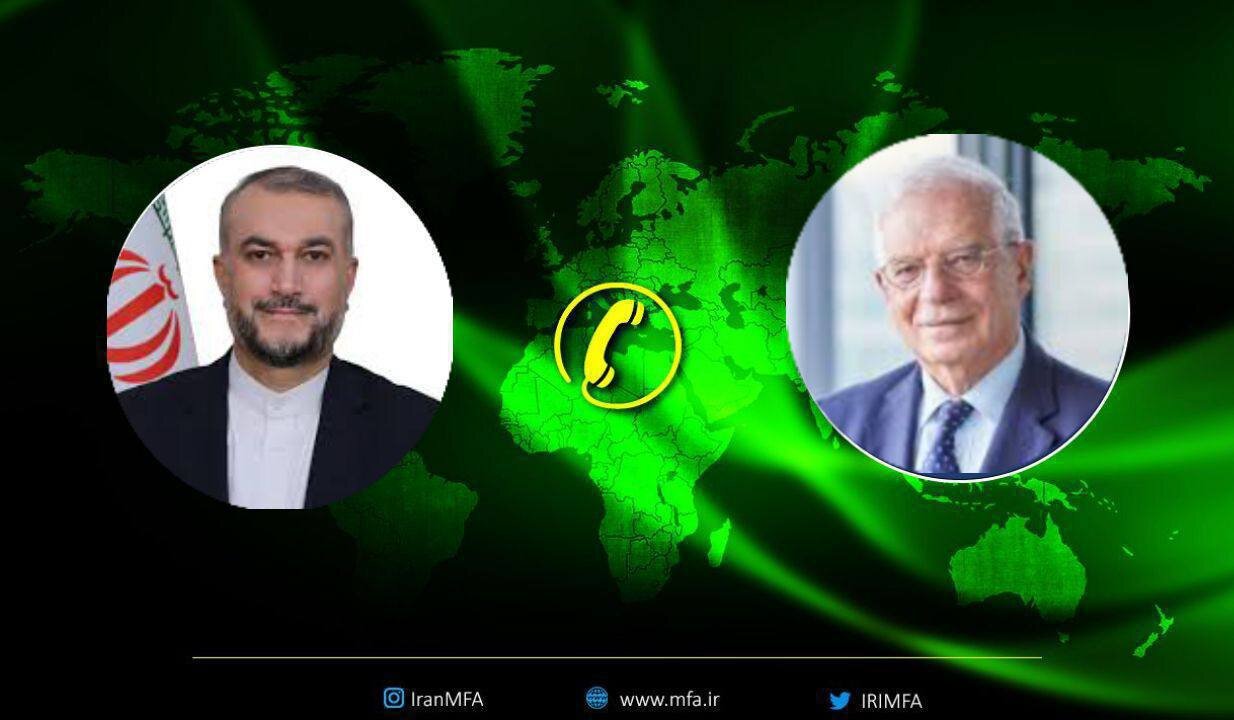FM slams EU persistent ‘ineffective’ sanctions on Iran

TEHRAN- Hossein Amir Abdollahian, the Iranian Foreign Minister, has lambasted the European Union for continuing its “ineffective” sanctions against the Islamic Republic.
Amir Abdollahian made the comments during a phone conversation late on Tuesday with Josep Borrell, the EU foreign policy chief.
“Sanctions are an unfriendly measure in the relations between the Islamic Republic and Europe,” Amir Abdollahian stressed.
He continued, “Know this that Europe does not stand to benefit from the continuation of this situation (implementation of the sanction policy towards Iran).”
Since Washington’s withdrawal from the nuclear agreement in May 2018, the EU has been toeing the U.S. line on sanctions against Iran.
The Trump administration exited the multilateral nuclear deal, officially called the Joint Comprehensive Plan of Action (JCPOA), in May 2018 in violation of UN Security Council resolution 2231 that endorsed the deal.
Based on the agreement, Iran agreed to put limits on its nuclear activities in exchange for termination of economic and financial sanctions
The agreement was signed between Iran, the five permanent members of the UN Security Council (Britain, France, China, Russia, and the U.S.) Germany, and the European Union.
Amir Abdollahian also praised Iran and the International Atomic Energy Agency (IAEA) for being on “the right track of cooperation.”
He also addressed the allegations by the West against the Islamic Republic that Iran sold drones to Russia for use in the Ukraine war.
The foreign minister insisted that “Ukraine has not presented us any reliable evidence for this claim either.” He added that “the accusation of application of Iranian drones against Ukraine is completely without foundation.”
Amir Abdollahian went on to say “that the Islamic Republic does not stand on ceremony when it comes to its foreign policy positions.”
Iran’s chief diplomat drew a comparison between the Palestinian issue and the Ukraine war from the perspective of the Islamic Republic, saying, “In the same way that the Islamic Republic has clearly announced that it backs Palestine, it similarly clarifies that it supports a political approach concerning the war in Ukraine.”
‘Misunderstandings between Iran, EU can be resolved through dialog’
For his part, Borrell said that some of the current misunderstandings between Iran and the EU could be “resolved through dialog.”
The senior European diplomat added that he would do every effort to bring back all parties to the JCPOA and emphasized the need for collaboration between Iran and the IAEA.
Iran insists on forming inclusive government in Afghanistan
In a meeting on Tuesday with Tariq Ali Bakheet, the OIC special representative for Afghanistan, Amir Abdollahian also reiterated Iran’s appeal for establishing an inclusive government in Afghanistan on the second anniversary of the Taliban’s takeover of power in the Central Asian country.
“The Islamic Republic of Iran, which enjoys 900 kilometers (559 miles) of common border with Afghanistan, addresses the Central Asian country’s developments with diligence and sensitivity,” Amir Abdollahian noted.
Tehran views the formation of an inclusive government with the involvement of all ethnic and religious groups as a remedy for Afghanistan’s current problems, Iran’s chief diplomat noted.
After making significant gains across the country, the Taliban swept back to power in August 2021.
The U.S. invaded Afghanistan in October 2001 following the September 11 attacks in the United States. The United States attacked Afghanistan after the Taliban, which was ruling Afghanistan at the time, refused to surrender al-Qaeda leader Osama bin Laden to the U.S.
The attacks on Afghanistan took place though no Afghan nationals were implicated in the September 11 assaults.
However, after 20 years the U.S. was forced to leave Afghanistan in a chaotic manner which its scenes are still fresh in the eyes of the people in the world. As the U.S. was exiting the country the Afghanistan government ruled by President Ashraf Ghani was toppled as Taliban forces captured the presidential palace.
Iran has linked the recognition of the Taliban government to the formation of an inclusive government in the country.
In his meeting with the OIC representative, Amir Abdollahian called for stepping up efforts to address the humanitarian problems that the Afghan people are facing.
Additionally, he demanded that millions of Afghan refugees living in Iran get international help.
According to the UNHCR, Iran is home to over 800,000 registered refugees and some 2.6 million undocumented Afghans. The flow of Afghans to Iran expedited After the Taliban took power in the country two years ago.
For his part, the OIC official viewed the Islamic Republic’s contribution to stabilizing Afghanistan as crucial and beneficial.
He also filed a report outlining his activities while serving as the OIC representative for Afghanistan.
There are some issues between Iran and the Taliban that need to be resolved.
On Sunday, Iranian Ambassador to Kabul Hassan Kazemi Qomi said that Iranian experts had visited Afghanistan’s Deh Ravod for the first time amid ongoing efforts by Tehran to settle a water dispute with Kabul.
Qomi, who is also a presidential envoy for Afghanistan, said the visit was aimed at finding a solution to the Iran-Afghanistan water dispute.
“Our technical delegation is currently in Kabul, the visit has been done and we will receive its report soon,” he said.
Based on the 1973 treaty, Afghanistan is legally obligated to allocate 820 million cubic meters of water from the Helmand River to Iran.
Leave a Comment